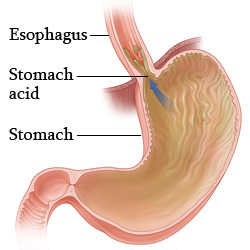Gastroesophageal Reflux Disease (GERD): Care Instructions
Overview

Gastroesophageal reflux disease (GERD) is the backward flow of stomach acid into the esophagus. The esophagus
is the tube that leads from your throat to your stomach. A one-way valve prevents the stomach acid from
backing up into this tube. But when you have GERD, this valve does not close tightly enough. This can also
cause pain and inflammation in your esophagus. (This is called esophagitis.) You may also hear GERD called
acid reflux.
If you have mild GERD symptoms including heartburn, you may be able to control the problem with antacids or
over-the-counter medicine. You can also make lifestyle changes to help reduce your symptoms. These include
changing your diet and eating habits, such as not eating close to bedtime and staying at a weight that's
healthy for you.
Follow-up care is a key part of your treatment and safety. Be sure to make and go to all
appointments, and call your doctor if you are having problems. It's also a good idea to know your test results
and keep a list of the medicines you take.
How can you care for yourself at home?
-
Take your medicines exactly as prescribed. Call your doctor if you think you are having a problem with
your medicine.
-
Your doctor may recommend over-the-counter medicine. For mild or occasional indigestion, antacids, such as
Tums, Mylanta, or Maalox, may help. Your doctor also may recommend over-the-counter acid reducers, such as
famotidine (Pepcid AC), cimetidine (Tagamet HB), or omeprazole (Prilosec). Read and follow all instructions
on the label. If you use these medicines often, talk with your doctor.
-
Stay at a weight that's healthy for you. Extra weight puts a lot of pressure on the valve between the
stomach and esophagus. Losing even a few pounds can help. Talk to your doctor if you need help losing
weight.
-
Change your eating habits.
-
Try to eat several small meals instead of two or three large meals.
-
After you eat, wait 2 to 3 hours before you lie down. Snacking close to bedtime can make your symptoms
worse.
-
Avoid foods that make your symptoms worse. These may include chocolate, mint, alcohol, pepper, spicy
foods, high-fat foods, or drinks with caffeine in them, such as tea, coffee, colas, or energy drinks. If
your symptoms are worse after you eat a certain food, you may want to stop eating it to see if your
symptoms get better.
-
Try to quit smoking or chewing tobacco, or cut back as much as you can. If you need help quitting, talk to
your doctor about quit-tobacco programs and medicines. These can increase your chances of quitting for good.
-
If you have GERD symptoms while trying to sleep, raise the head of your bed 6 to 8 inches by putting the
frame on blocks or placing a foam wedge under the head of your mattress. (Adding extra pillows does not
work.)
-
Do not wear tight clothing around your middle.
When should you call for help?
 Call 911
anytime you think you may need emergency care. For example, call if:
Call 911
anytime you think you may need emergency care. For example, call if:
Call your doctor now or seek immediate medical care if:
Watch closely for changes in your health, and be sure to contact your doctor if:
Current as of: October 19, 2023
Content Version: 14.0
Care instructions adapted under license by your
healthcare professional. If you have questions about a medical condition or this instruction, always ask
your healthcare professional. Healthwise, Incorporated disclaims any warranty or liability for your use of
this information.